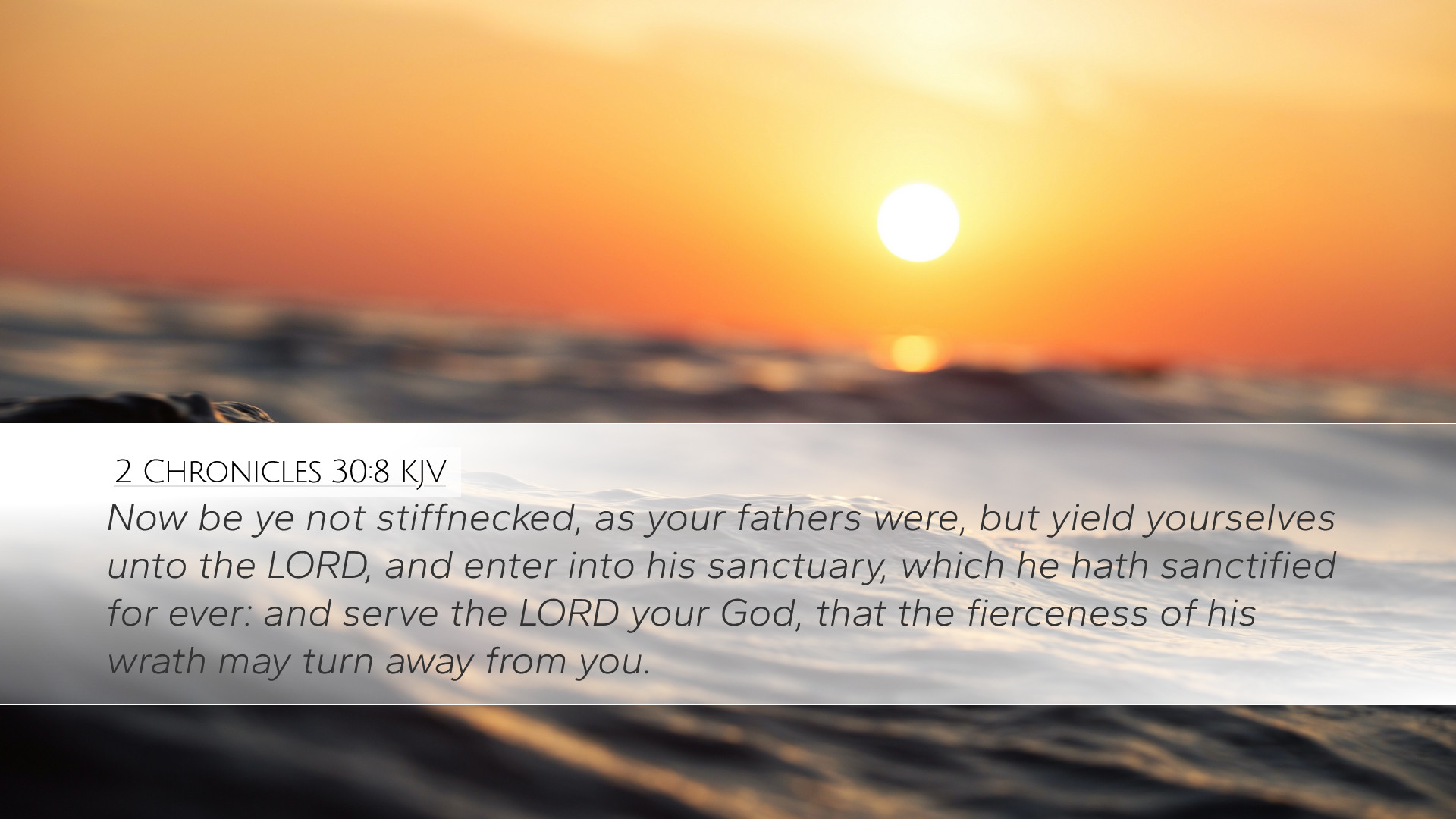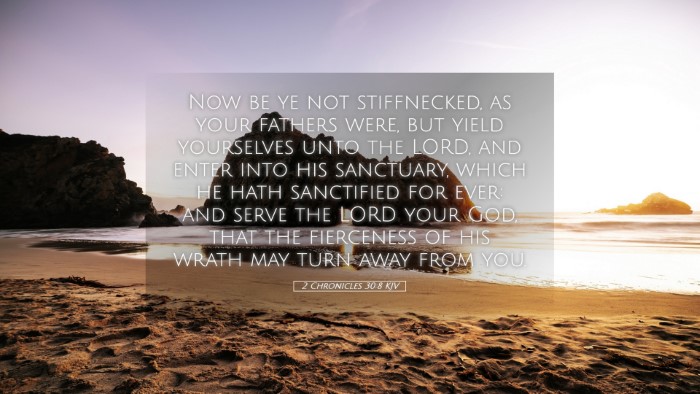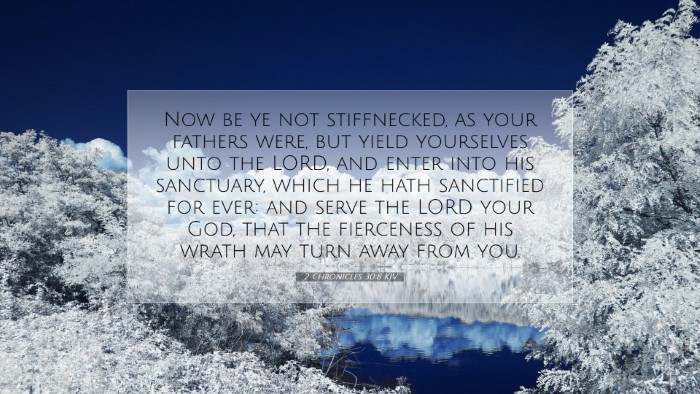Commentary on 2 Chronicles 30:8
Verse Context: 2 Chronicles 30:8 states, "Now do not be stiff-necked, as your fathers were, but yield yourselves to the LORD and enter his sanctuary, which he has consecrated forever, and serve the LORD your God, that his fierce anger may turn away from you."
Introduction
This verse comes in the context of King Hezekiah's efforts to unify the people of Judah and Israel in worship after a period of neglect and deviation from the covenantal requirements laid out by God. Hezekiah calls for repentance and renewal, emphasizing the importance of yielding to God and returning to a genuine relationship with Him.
Thematic Insights
- Repentance: The call to not be stiff-necked highlights the need for humility and contrition among the people. Throughout the scriptures, pride often leads to rebellion against God.
- The Nature of God: The mention of the “fierce anger” of God serves as a sober reminder of the consequences of sin and the need for reconciliation with Him.
- Sanctuary and Worship: Entering the sanctuary signifies a place of holiness and divine presence, and Hezekiah's encouragement to serve the Lord reflects ongoing commitment to worship and obedience.
Detailed Commentary
Historical Context: According to Matthew Henry, this chapter details a pivotal moment in the history of Judah, as Hezekiah seeks to revive the feasts and rituals neglected through years of idolatry under previous kings. The call to repentance is aimed at both individuals and the community, urging them to forsake their former ways.
Spiritual Admonitions: Albert Barnes emphasizes the emphasis on yielding to God, which suggests a necessary posture of submission and recognition of divine authority. This idea of yielding is crucial in understanding the relationship between humanity and God; it reflects the heart's disposition towards obedience.
The Consecration of the Sanctuary: Adam Clarke notes the significance of the sanctuary being consecrated forever, implying that despite the people's failures, God’s plans and purposes remain intact. The sanctuary symbolizes a place where the people can encounter God, and the urgency to serve Him indicates that worship is not merely a ritual, but a vital aspect of their identity as God’s people.
Exegesis of Key Phrases
- "Do not be stiff-necked": This metaphor conveys a resistance to divine authority, reminiscent of the people’s historical rebellion against God’s commands. Stiff-necked signifies an unyielding attitude that leads to spiritual blindness.
- "Yield yourselves to the LORD": The term 'yield' connotes an active choice to surrender one’s will to God’s purposes, calling congregants to a definitive act of faith that results in tangible change.
- "Enter his sanctuary": Entering the sanctuary is an invitation to come before God, highlighting the accessibility of worship and the communal aspect of faith.
- "That his fierce anger may turn away from you": This phrase underscores the seriousness of turning back to God; it reflects the consequences of sinned and the hope of divine mercy upon genuine repentance.
Theological Implications
The theological implications of this verse resonate with themes of grace, repentance, and divine judgment. As highlighted by Matthew Henry, God's disposition is always one of invitation to return and be restored, counteracting the consequences of past iniquities with His mercy. The process of repentance is not merely an emotional response but a thorough realignment with God’s will, as emphasized by Albert Barnes' commentary on obedience being intrinsic to worship.
Moreover, Adam Clarke's reflections on the sanctuary reveal the necessity of sacred spaces in our spiritual journeys. Historical sanctuaries were places where God’s presence dwelt uniquely, and the call to worship in this context serves as a reminder of the need for believers today to find their own 'sanctuaries'—places where they can encounter God authentically.
Practical Applications
For pastors and church leaders, 2 Chronicles 30:8 serves as a potent reminder of the importance of leading congregants in genuine worship and repentance. It challenges leaders to foster an environment where humility before God is encouraged, emphasizing that true worship stems from a heart that yields.
For students and theologians, this scripture offers rich material for understanding the dynamics of communal worship, the role of leadership in spiritual renewal, and the continuing relevance of Old Testament practices for contemporary faith experiences. It opens dialogues on how God’s covenantal faithfulness calls believers to respond actively in their faith journey.
Ultimately, this verse is a clarion call for all believers to revisit their hearts and be reminded of the necessity of turning toward God, entering into His presence, and acknowledging His lordship over their lives.
Conclusion
2 Chronicles 30:8 encapsulates a pivotal moment of decision—a call to yield, to return, and to worship—a timeless reminder for God's people. As the faithful reflect upon this scripture, they are nudged towards a life characterized by humility and authentic service to God.


